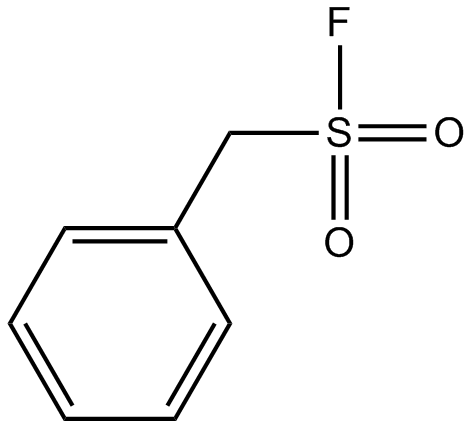PMSF (Synonyms: Benzylsulfonyl fluoride, NSC 88499, PMSF) |
| Catalog No.GC10477 |
A nonspecific, irreversible serine protease inhibitor
Products are for research use only. Not for human use. We do not sell to patients.

Cas No.: 329-98-6
Sample solution is provided at 25 µL, 10mM.
PMSF (Phenylmethanesulfonyl fluoride) is an irreversible serine/cysteine protease inhibitor and PMSF commonly used in the preparation of cell lysates [1,2]. phenylmethylsulfonyl fluoride (PMSF) is also an inhibitor of fatty acid amide hydrolase (FAAH) [3].
Aqueous preparations of PMSF become inactive toward proteases unless promptly brought into contact with protease. Inactivation of PMSF increases with increased pH and temperature. Half-lives of the inhibitor at 25°C are approximately 110,55, and 35 min at pH 7.0, 7.5, and 8.0, respectively. At pH 8, 100 μM PMSF is almost completely inactivated within 1 hr at 25°C or within 22 hr at 4°C. Stock solutions of PMSF in 100% isopropanol are stable at 25°C for months if not longer. Reactivation of PMSF-inhibited chymotrypsin did not occur within 1 week at 25°C at pH 7.0 [4]. PMSF inhibits the acylation of the inositol residue of GPI intermediates in bloodstream form T. brucei. PMSF inhihits the formntion of glycolipid C but does not inhibit fatty acid remodeling in vitro. PMSF inhihits GPI acylation and ethanolamine phosphatp addition in procyclic trypanosomes but not in Hela cells [5].
PMSF has a notable antinociceptive effect at doses 120 and 300 mg/kg. The dose of (60 mg/kg, i.p.) PMSF was considered as a sub-antinociceptive dose. A sub-antinociceptive dose (60 mg/kg) of PMSF could reduce tolerance in both acute and chronic methods of administration. However, alleviation of dependence and suppression of oxidative stress markers occurred in the chronic administration of PMSF [3].
References:
[1]. Tunlid A, Jansson S. Proteases and their involvement in the infection and immobilization of nematodes by the nematophagous fungus Arthrobotrys oligospora[J]. Applied and Environmental Microbiology, 1991, 57(10): 2868-2872.
[2]. Rajakumar A, Brandon H M, Daftary A, et al. Evidence for the functional activity of hypoxia-inducible transcription factors overexpressed in preeclamptic placentae[J]. Placenta, 2004, 25(10): 763-769.
[3]. Akbarabadi E A, Vardanjani H R, Molavinia S, et al. PMSF Attenuates Morphine Antinociceptive Tolerance and Dependence in Mice: Its Association with the Oxidative Stress Suppression[J]. Iranian Journal of Pharmaceutical Research: IJPR, 2021, 20(3): 300.
[4]. James G T. Inactivation of the protease inhibitor phenylmethylsulfonyl fluoride in buffers[J]. Analytical biochemistry, 1978, 86(2): 574-579.
[5]. Güther M L, Masterson W J, Ferguson M A. The effects of phenylmethylsulfonyl fluoride on inositol-acylation and fatty acid remodeling in African trypanosomes[J]. Journal of Biological Chemistry, 1994, 269(28): 18694-18701.
Average Rating: 5 (Based on Reviews and 30 reference(s) in Google Scholar.)
GLPBIO products are for RESEARCH USE ONLY. Please make sure your review or question is research based.
Required fields are marked with *




